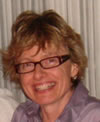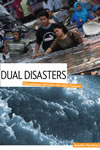Introducing Jennifer Hyndman
 Jennifer Hyndman obtained her Phd at the University of British Columbia and is currently Professor in Social Science/Geography at York University in Toronto (Canada). Moreover, she is Associate Director of the Research Centre for Refugee Studies at the same university.
Jennifer Hyndman obtained her Phd at the University of British Columbia and is currently Professor in Social Science/Geography at York University in Toronto (Canada). Moreover, she is Associate Director of the Research Centre for Refugee Studies at the same university.
Professor Hyndman’s research combines political, economic, cultural and feminist geography, focusing on people’s mobility, displacement and security. She has a special interest in the dynamics of conflict and disaster that create refugees and internally displaced persons, as well as international humanitarian responses to such crises.
Professor’s Hyndman recent work looks into the intersection of conflict with the 2004 tsunami in Sri Lanka and Aceh, Indonesia, as well as the politics of international aid in these locations. Her work further addresses geographies of immigration, exclusion, containment, and the production of ‘securitized’ space both in the Global South and in North America.
Geopolitical Passport
Your relationship with geopolitics
At what age did you discover geopolitics and what attracted you to it?
Sanctions against South Africa in the 1980s were a powerful introduction to geopolitics of a sort.
Which geopolitical topics have your focus and why did you choose especially these?
I came to geopolitics through the back door. During graduate school at UBC, there was no political geography program or cluster to speak of; critical geography was happening under the rubric of cultural geography. Geopolitics, to put it simply, was not part of the intellectual culture of the department.
I started reading critical geopolitics on my own in the mid-1990s and found it to be a fascinating and exciting way into geopolitics, one that jibed with my feminist and poststructuralist leanings. Yet, I found the discursive bend of critical geopolitics rather disembodied and free-floating: clever thinking but as I have written elsewhere, with no clear way forward in practice.
My work in humanitarian emergencies and refugee studies aimed to bolster the then undertheorized terrain of these fields, and critical geopolitics was a good way to bring to bear an overly state-centric language of UNese and internationalism down to earth.
What do you consider your most important contribution to geopolitics?
My most important contribution to geopolitics might be the concept of feminist geopolitics that insists upon a materiality to the often disembodied critique of critical geopolitics and the state-centric framings of dominant IR discourse. I have also written about the problem in critical geopolitics of remaining political relevant and yet avoiding subscription to any singular normative principle, such as ‘non-violence’ (see Megoran, 2008 on this point).
I am also very interested in the geopolitics of aid after humanitarian disasters (especially conflict), and did a film (2009) on post-tsunami geopolitics in Aceh, Indonesia; see http://vimeo.com/7490800 and contact me for the password.
My geopolitical preferences
What is your favourite definition of geopolitics?
I like Gerard Toal’s early definition of critical geopolitics, which for me is geopolitics: Within geography, “[c]ritical geopolitics is one of many cultures of resistance to Geography as imperial truth, state-capitalized knowledge, and military weapon (Ò Tuathail, 1996, p. 256).
Which geopolitical scientist do you admire the most?
I don’t see geopolitics as a science but rather a social science fraught with and all about power relations, their spatiality, and the constellations of violence and conflict they produce. It’s hard to say whom I appreciate most, but I have to say that I am indebted to the pioneers of critical geopolitics (you know who you are!) for persuading me I the first place.
What is your favourite geopolitical book?
I love reading the second edition of “The Geopolitics Reader” with my students who exclaim that Osama Bin Laden was a closet geographer. Gerard Toal’s classic book, “Critical Geopolitics”, has also been formative to my thinking.
What is your favourite geopolitical website?
Good question: I am not a blogger nor do I dwell a lot on websites, so perhaps this one! One of my regular websites since the ‘war on terror’ began has been bodycount.org.
The geopolitical future
In what direction(s) will geopolitical science be heading the coming decades?
It’s hard to say and dangerous to predict. International relations continues to be a staple of graduate university curricula and US State Department recruiting. Will the minor key voices of projects like critical geopolitics have much impact on these discourses? I’d like to think so. Certainly, theories of ‘the state’ have come a long way since the 1980s (i.e. Painter, Mountz), and I hope that these kind of innovations will continue in geopolitics.
Which geopolitical subject has been too little in the spotlight and needs further research?
Corporeal violence. There is not enough accountability to the torture, detention, and viscerality of actual violence in the context of geopolitical strife. I have read one too many disembodied accounts of state/resource relations in Darfur, Congo, Haiti, Afghanistan and Iraq.
What will be the largest geopolitical challenge for the world in the 21st century?
Again, predictions only get us in trouble. Under the Bush Administration, I would have said, taming American imperialism. Next is fixing American unilateralism, eliminating extraordinary rendition, and for Canada, figuring out how our foreign policy differs from the US.

